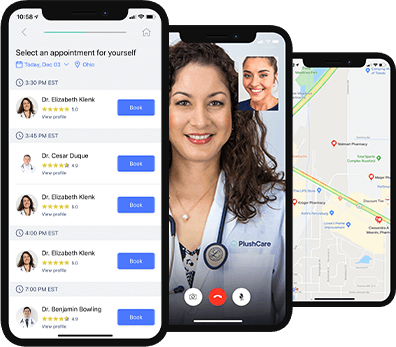What to Do If You Have Strep Throat While Pregnant
Sore throats are a common symptom of countless ailments. Your throat may be irritated by allergies. You may have a cold or flu. Or, you may have just been using your voice too much. The most common cause of sore throat is strep throat.
It is particularly common in school-aged children, 5 to 15 years old. Estimates suggest that up to 40 percent of cases of sore throat in this age group are caused by strep, and studies show that on average, kids will get one strep infection every 4 years.
Those statistics can be worrisome, especially for pregnant women. While strep throat itself is not dangerous, having a high fever can be. Specific medication is recommended for pregnant women to protect the baby and there are home remedies that can help. Let’s take a look at what you should do if you have strep throat when you are an expectant mother.

1
Book on our free mobile app or website.
Our doctors operate in all 50 states and same day appointments are available every 15 minutes.
2
See a doctor, get treatment and a prescription at your local pharmacy.
3
Use your health insurance just like you normally would to see your doctor.
What is Strep Throat?
Strep throat, alternately known as streptococcal pharyngitis, is a highly contagious infection caused by streptococcal bacteria. The infection results in inflammation and swelling in the mucus membrane that lines the back of your throat, leading to a characteristic sore throat.
While there are various types of streptococcal bacteria, strep throat is primarily caused by group A Streptococcus, which is scientifically known as Streptococcus pyogenes. These bacteria invade the pharyngeal tissue (the tissue in the back of your throat), causing a reaction that inflames your tonsils and throat.
Group A Streptococcus is found on the skin or in the throat. It is also responsible for certain skin infections, like impetigo and cellulitis, as well as toxic shock syndrome and scarlet fever.
The other common form of streptococcal bacteria is group B Streptococcus, but these bacteria are much rarer and tend to be more responsible for bacterial pneumonia, blood infections, and meningitis, an infection of the membrane that wraps around the brain and spinal cord.
Group B Streptococcus is usually found around the vagina and anus, and while it can be passed along to the baby during delivery, most women should get screened for group B Streptococcus between the 35th and 37th week.
Read: Sore Throat Treatment Online
How Strep Throat Spreads
Strep throat is easily passed from one person to the next, often through direct contact. The bacteria mainly take root in the mucus membranes of your nose, throat, and mouth, so it can easily travel via the airborne water droplets from sneezing or coughing.
This is why it is so common in large groups of people in close proximity, particularly school-age children who may not know to cover their mouths. The bacteria can also spread when you come in contact with an object that may have the bacteria on it, including keyboards, phones, doorknobs, and kitchen utensils.
Strep throat may also be transmitted via food that has been contaminated by the bacteria, though these foodborne outbreaks are not nearly as common.
Symptoms of Strep Throat
Some people may carry the bacteria and show no symptoms at all. Those who do develop strep throat usually show symptoms within 1 to 4 days after first getting exposed to the bacteria with symptoms ranging from mild to severe.
The primary symptom of strep throat in kids and adults is a raw, red sore throat that comes on suddenly. Your tonsils may also be inflamed and swollen with white patches. Other common symptoms that you may experience include:
A fever, possibly 101 degrees Fahrenheit or higher
Painful swallowing
Swollen, tender lymph nodes in the neck
Headache
Small red spots on the roof of your mouth
Chills
Nausea, gut pain, and loss of appetite
General discomfort and fatigue
In rare instances, you may suffer from body aches or a rough, red skin rash. The latter may suggest possible scarlet fever.

1
Book on our free mobile app or website.
Our doctors operate in all 50 states and same day appointments are available every 15 minutes.
2
See a doctor, get treatment and a prescription at your local pharmacy.
3
Use your health insurance just like you normally would to see your doctor.
Diagnosing Strep Throat During Pregnancy
Although sore throats are the most prominent symptom, most sore throats are caused by viral infections. If your sore throat is accompanied by coughing, sneezing, and general cold and flu symptoms, you are likely suffering from a viral infection. The only way to truly know if you have strep throat is to get diagnosed by a physician.
Thankfully, the diagnosis process is simple, painless, and relatively quick. Along with a general physical examination, your doctor will take a sample of the fluid from the back of your throat using a cotton swab. They can use the sample to perform a rapid strep test, which can detect the presence of group A Streptococcus in less than five minutes.
If the rapid strep test shows positive results, your doctor will proceed with prescribing treatment. If the test offers negative results, the physician will send the sample to a lab to get definitive results, just to be safe. At the lab, they can create a throat culture and know for sure if you are suffering from strep throat or another separate disease. It usually takes no more than 48 hours to get results from a throat culture test.
Is Strep Throat Dangerous During Pregnancy?
Strep throat is not generally dangerous to expectant mothers, especially if you consult with an experienced online doctor and get treated for it as soon as you notice symptoms. Any antibiotics prescribed for strep throat treatment, including penicillin and cephalosporin, should be safe for use during pregnancy.
The only true symptom that could pose a threat to your baby is a high fever. A severe fever during your first trimester may prevent the fetus’ vital organs from developing properly. As soon as you experience fever, do your best to reduce it immediately. If your fever is persistent, consult your doctor to check the health of the growing fetus and for more substantial treatment to neutralize the fever and the infection.
How do you Treat Strep Throat While Pregnant?
Strep throat in toddlers, children, and adults (including expecting mothers) can be easily treated with antibiotics, usually penicillin, amoxicillin, and cephalexin. So, what can you take for a sore throat while pregnant and what is cures strep throat fast?
Penicillin – Assigned to pregnancy category B by the FDA, penicillin has been shown to have no negative impact on women as long as they are not allergic to the drug. Diarrhea is often associated with any antibiotic use, but contact your doctor just in case as it may point to a penicillin allergy. Studies show that small amounts of penicillin may also pass into your breast milk, but there is no evidence of negative side effects when using penicillin while breastfeeding.
Amoxicillin – Amoxicillin has also been assigned to pregnancy category B. Animal studies show that amoxicillin use has no effect on the growth or development of the baby, but controlled human studies are lacking. Amoxicillin is usually only prescribed in pregnant women if the benefit outweighs the risk.
Cephalexin – According to animal studies, cephalexin should have no negative effects on the fetus, nor should it affect fertility. However, cephalexin has been shown to cross through the placenta and distribute to the fetus, and there are very few controlled studies on its effects on pregnant women. Cephalexin should generally be avoided unless you truly need it.
Can taking antibiotics while pregnant hurt the baby?
As safe as antibiotics are, you should never overdose on them. Taking too many antibiotics can be harmful to both you and your baby. Take the antibiotics as prescribed by your doctor. Your symptoms should generally improve within the first 24 hours of treatment, but do not take more if the antibiotics seem to have no effect. Instead, talk to your doctor for a new treatment plan.
Similarly, make sure you take the complete course of the antibiotics you have been prescribed. Even if you feel better, the full course is designed to eliminate the bacteria from your system.
Taking insufficient antibiotics may leave bacteria in your system, allowing them to grow and potentially cause even more severe symptoms. The bacteria can also gain immunity to the antibiotics, meaning you may have to take more powerful antibiotics that may present harmful side effects for you and your baby.
Home Care for Strep Throat During Pregnancy
How do you get rid of burning in your throat while pregnant? There are a variety of things you can do at home to ensure your own comfort and expedite your recovery from strep throat. The most important thing is to stay hydrated. Drink plenty of water and juice, and avoid any acidic drinks, like orange juice or lemonade, which may just irritate your throat more.
Does apple cider vinegar kill strep throat? While this concoction does have some antibacterial properties, there is no research showing its effectiveness killing strep throat bacteria. Some people claim the drink provides soothing relief for a sore throat.
Focus on cold liquids to numb any pain and warm drinks, like broth and tea, to soothe your throat. You can also try gargling a mixture of salt and water to soothe pain and remove bacteria in your throat.
Garlic is also a common home remedy for strep throat. It is considered a natural antibiotic that may help reduce your symptoms. You can chew a clove of garlic, letting the juice flow down your throat. You only need to keep the clove in your mouth and do not need to swallow it. Alternately, you can mix a tablespoon of garlic with a quarter teaspoon of cinnamon and cayenne pepper in a cup of water.
Can you take sore throat sweets when pregnant? Yes, sore throat sprays and lozenges are safe to consume while pregnant.
Try to stay somewhere warm and humid to keep from irritating your throat any further. You may consider investing in a cool-mist humidifier. However, make sure you keep the humidifier clean as instructed by the manual. Otherwise, you may just be spreading more bacteria.

1
Book on our free mobile app or website.
Our doctors operate in all 50 states and same day appointments are available every 15 minutes.
2
See a doctor, get treatment and a prescription at your local pharmacy.
3
Use your health insurance just like you normally would to see your doctor.
Tips for Preventing Strep Throat During Pregnancy
Preventing strep throat can be difficult in general. Those who carry the bacteria do not always show symptoms, making it difficult to determine your immediate risk. If you do know someone who has strep throat, try to keep away from them until they have received treatment and their symptoms have subsided. Avoid sharing food, utensils, towels, and other objects as they may be infected with the bacteria.
Staying hydrated with plenty of fluids is a great way to reduce your risk of infection. When you have been out in public, make sure you wash your hands frequently, especially before you plan to eat anything.
When should you go to the doctor with a sore throat when pregnant? If you experience any serious complications or discomfort or your symptoms remain for longer than a couple of weeks, you may require an online prescription. Consult your physician or visit an urgent care center.
It is not uncommon for women to experience flu-like symptoms during early pregnancy. Many women report headaches, muscle ache, nausea, and vomiting as early pregnancy signs. Because these are also symptoms of the flu, it is important to see a doctor if your conditions becomes serious. You can get treatment through virtual doctor appointments with PlushCare's board-certified physicians.
During pregnancy, fluctuating hormones in your body may result in dry mouth, excessive thirst, and sore throat. This experience is very common for pregnant women, especially during the early stages of pregnancy.
A sore throat during pregnancy is common and rarely dangerous. Serious complications can arise if the infection becomes serious in the mother, so seek out professional consultation if the infection does not go away after a week. Know that pregnant women are just as likely to get strep throat as everybody else and it's typically no reason to panic.
Read more from our strep throat series:
Sources:
PlushCare is dedicated to providing you with accurate and trustworthy health information.
Mayo Clinic. Strep Throat - Symptoms and Causes. Accessed February 14, 2021 at https://www.mayoclinic.org/diseases-conditions/strep-throat/symptoms-causes/syc-20350338
Centers for Disease Control and Prevention. Strep Throat: All You Need to Know. Accessed February 14, 2021 at https://www.cdc.gov/groupastrep/diseases-public/strep-throat.html
Mayo Clinic. Strep Throat - Diagnosis and Treatment. Accessed February 14, 2021 at https://www.mayoclinic.org/diseases-conditions/strep-throat/diagnosis-treatment/drc-20350344



